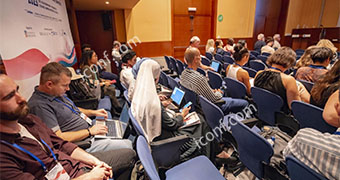

274 views||Release time: Dec 19, 2024
Choosing a conference theme that is aligned with the latest trends, breakthroughs, and challenges in the field ensures that the event will be timely and valuable. Whether it's a groundbreaking technological advancement or an emerging societal issue, a theme rooted in current developments will attract researchers and practitioners eager to discuss the latest research.

Select a theme that invites novel approaches, innovative solutions, or interdisciplinary perspectives. Encouraging new ideas can spark creative conversations and result in unexpected insights. Themes that focus on innovative methodologies or cross-disciplinary applications tend to generate more dynamic discussions.
Choosing a conference theme that addresses gaps in the existing literature or uncharted areas of study provides an opportunity for researchers to contribute valuable new knowledge. Focus on areas where there are ongoing debates, unsolved questions, or areas that have yet to be fully explored.
A good conference theme should invite problem-solving discussions. Themes centered on practical solutions or real-world challenges often attract attendees looking to make an impact through their research. These topics can drive innovation and lead to collaborations with tangible outcomes.
Tailor the conference theme to the interests and needs of your target audience. Consider what topics are likely to engage your primary participants, whether they are academic researchers, industry professionals, policymakers, or students. A theme that resonates with your audience will encourage higher levels of participation and engagement.
While a broad theme may seem appealing to a larger audience, it's important to balance general appeal with specificity. A topic that is too broad may fail to capture the depth of discussion, while an overly specific theme might limit participation. Aim for a theme that offers enough depth to facilitate in-depth exploration, while also being broad enough to attract a wide range of submissions.
Academic conferences can greatly benefit from the inclusion of interdisciplinary themes that bridge multiple fields. This creates opportunities for diverse perspectives and richer discussions. Consider selecting a theme that invites scholars from different academic backgrounds to collaborate and exchange ideas.
Themes that focus on real-world problems, especially those that require input from various disciplines, can stimulate a broad range of responses. This approach encourages collaboration and creates opportunities for impactful research that extends beyond academia.
When choosing a conference theme, consider consulting with thought leaders and experts in your field. Their insights can help ensure the theme is relevant and important. Early input from influential speakers can also enhance the quality of your conference program.
The scope of the theme will determine the scale of the conference. A more specific theme may result in a niche audience, while a broader theme may attract a larger, more diverse group of participants. Understanding the desired size and scope of your conference will help you narrow down the theme.
A strong conference theme should not only be timely but should also contribute to the long-term advancement of knowledge in the field. Aim for a theme that has the potential to generate ongoing discussion, inspire future research, and influence academic and practical outcomes.
Consider how the theme will be reflected in conference proceedings or journal special issues. Themes with broader implications are more likely to generate interest from journals and publishers, providing further visibility for the conference and participants.
Choosing the right conference theme is a crucial first step in creating an engaging and impactful academic event. By selecting a topic that is relevant, timely, and offers interdisciplinary opportunities, you can attract a wide audience, foster meaningful discussions, and advance knowledge in your field. Whether you're organizing a conference on iconf.com or another platform, remember that the theme sets the tone for the entire event and influences the quality of submissions and presentations.
For more insights into academic conferences and upcoming opportunities, visit iconf.com and start exploring the best themes for your next conference.